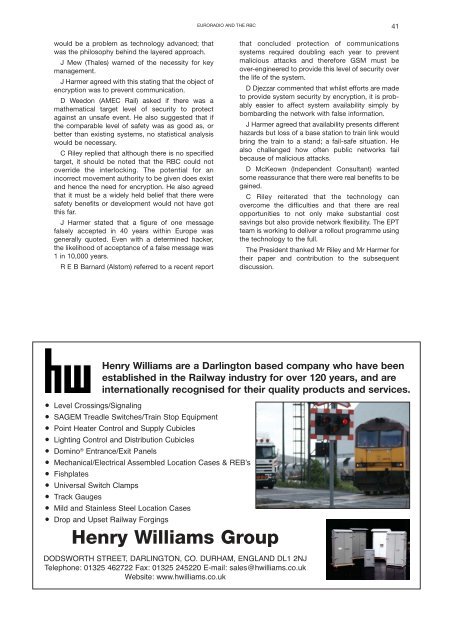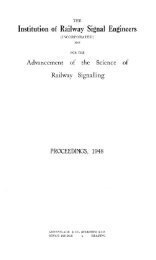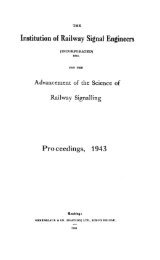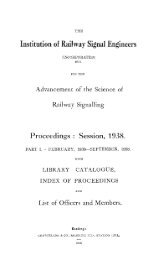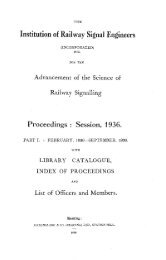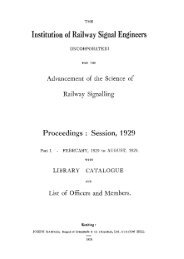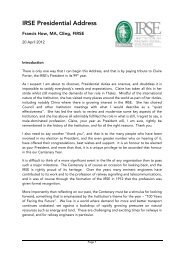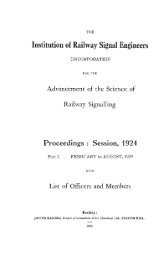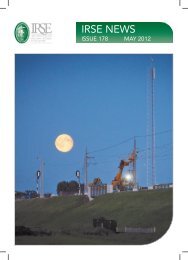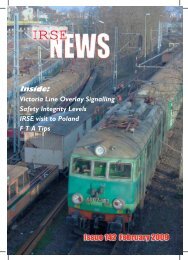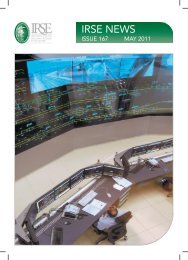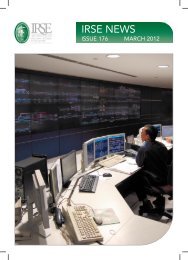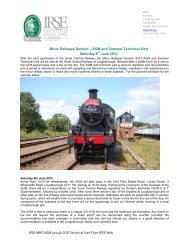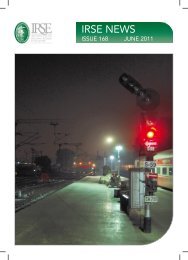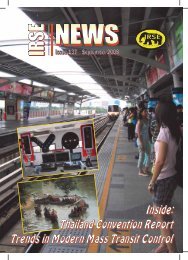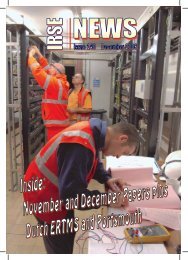Proceedings 2002/2003 - IRSE
Proceedings 2002/2003 - IRSE
Proceedings 2002/2003 - IRSE
You also want an ePaper? Increase the reach of your titles
YUMPU automatically turns print PDFs into web optimized ePapers that Google loves.
EURORADIO AND THE RBC 41<br />
would be a problem as technology advanced; that<br />
was the philosophy behind the layered approach.<br />
J Mew (Thales) warned of the necessity for key<br />
management.<br />
J Harmer agreed with this stating that the object of<br />
encryption was to prevent communication.<br />
D Weedon (AMEC Rail) asked if there was a<br />
mathematical target level of security to protect<br />
against an unsafe event. He also suggested that if<br />
the comparable level of safety was as good as, or<br />
better than existing systems, no statistical analysis<br />
would be necessary.<br />
C Riley replied that although there is no specified<br />
target, it should be noted that the RBC could not<br />
override the interlocking. The potential for an<br />
incorrect movement authority to be given does exist<br />
and hence the need for encryption. He also agreed<br />
that it must be a widely held belief that there were<br />
safety benefits or development would not have got<br />
this far.<br />
J Harmer stated that a figure of one message<br />
falsely accepted in 40 years within Europe was<br />
generally quoted. Even with a determined hacker,<br />
the likelihood of acceptance of a false message was<br />
1 in 10,000 years.<br />
R E B Barnard (Alstom) referred to a recent report<br />
that concluded protection of communications<br />
systems required doubling each year to prevent<br />
malicious attacks and therefore GSM must be<br />
over-engineered to provide this level of security over<br />
the life of the system.<br />
D Djezzar commented that whilst efforts are made<br />
to provide system security by encryption, it is probably<br />
easier to affect system availability simply by<br />
bombarding the network with false information.<br />
J Harmer agreed that availability presents different<br />
hazards but loss of a base station to train link would<br />
bring the train to a stand; a fail-safe situation. He<br />
also challenged how often public networks fail<br />
because of malicious attacks.<br />
D McKeown (Independent Consultant) wanted<br />
some reassurance that there were real benefits to be<br />
gained.<br />
C Riley reiterated that the technology can<br />
overcome the difficulties and that there are real<br />
opportunities to not only make substantial cost<br />
savings but also provide network flexibility. The EPT<br />
team is working to deliver a rollout programme using<br />
the technology to the full.<br />
The President thanked Mr Riley and Mr Harmer for<br />
their paper and contribution to the subsequent<br />
discussion.<br />
Level Crossings/Signaling<br />
• Fishplates<br />
Universal Switch Clamps<br />
Track Gauges<br />
•<br />
Henry Williams are a Darlington based company who have been<br />
established in the Railway industry for over 120 years, and are<br />
internationally recognised for their quality products and services.<br />
SAGEM Treadle Switches/Train Stop Equipment<br />
Point Heater Control and Supply Cubicles<br />
Lighting Control and Distribution Cubicles<br />
• Domino® Entrance/Exit Panels<br />
Mechanical/Electrical Assembled Location Cases & REB’s<br />
Mild and Stainless Steel Location Cases<br />
Drop and Upset Railway Forgings<br />
Henry Williams Group<br />
DODSWORTH STREET, DARLINGTON, CO. DURHAM, ENGLAND DL1 2NJ<br />
Telephone: 01325 462722 Fax: 01325 245220 E-mail: sales@hwilliams.co.uk<br />
Website: www.hwilliams.co.uk


